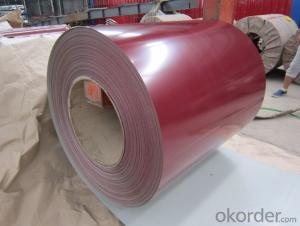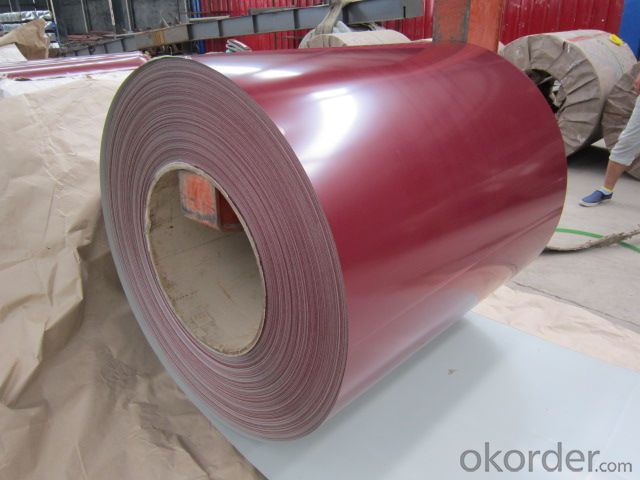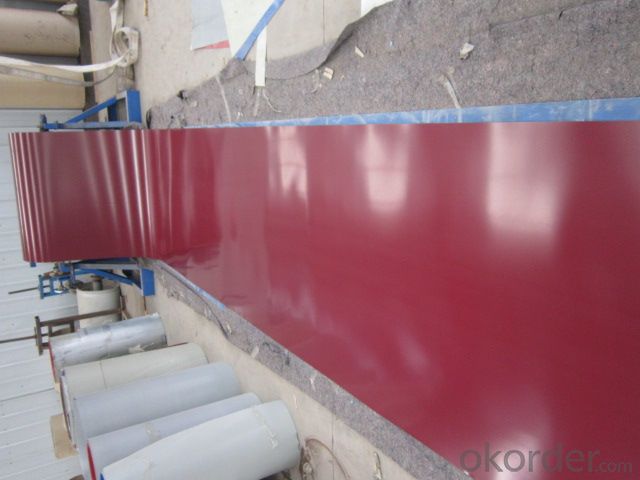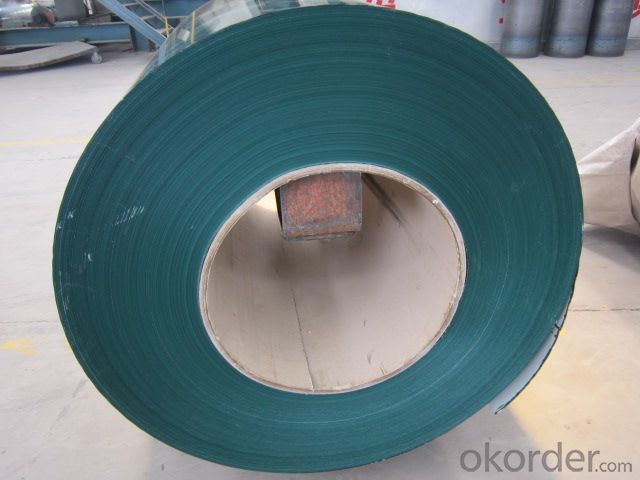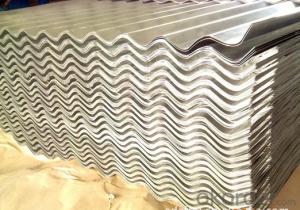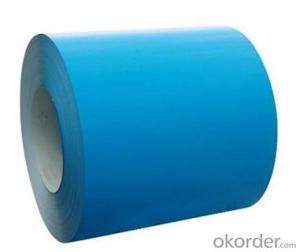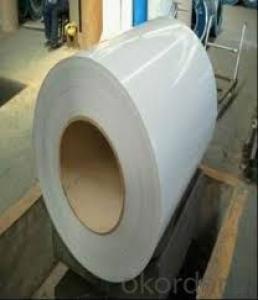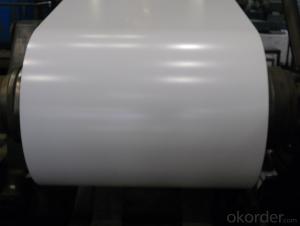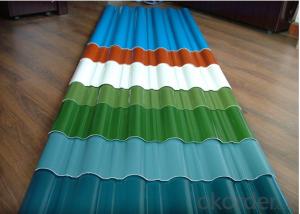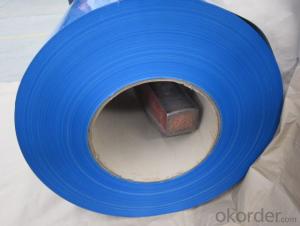Pre Painted Galvanized SteelCoil Colored
- Loading Port:
- Shanghai
- Payment Terms:
- TT OR LC
- Min Order Qty:
- 25 m.t.
- Supply Capability:
- 5000 m.t./month
OKorder Service Pledge
OKorder Financial Service
You Might Also Like
Description:
PPGI-Pre-painted galvanised iron is also known as pre-coated steel, typically with a hot dip zinc coated steel substrate.
Galvanization, or galvanisation, is the process of applying a protective zinc coating to steel or iron, to prevent rusting. The most common method is hot-dip galvanization, in which parts are submerged in a bath of molten zinc. Galvanizing protects in two ways:
It forms a coating of corrosion-resistant zinc which prevents corrosive substances from reaching the more delicate part of the metal.
The zinc serves as a sacrificial anode so that even if the coating is scratched, the exposed steel will still be protected by the remaining zinc.
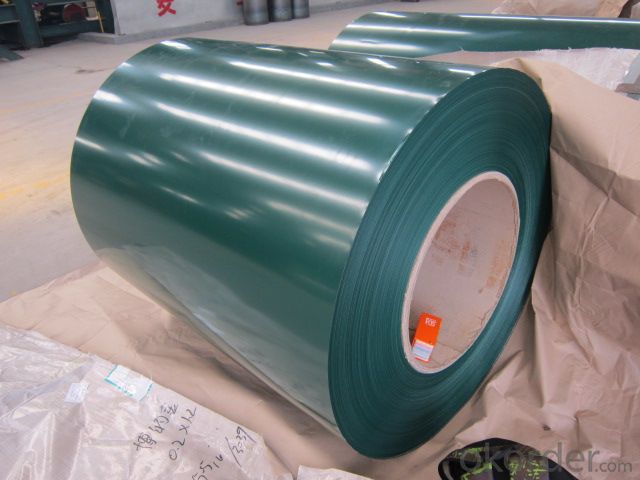
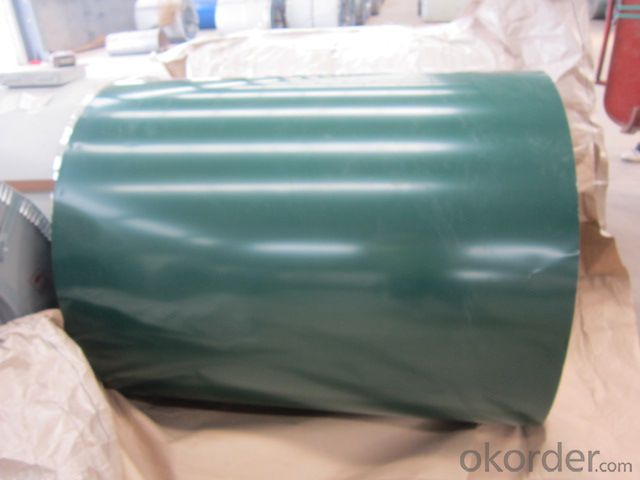
Application:
Suitable for indoor or outdoor decoration, color lasting for at least 10 years for outdoor using, could for roll forming., conditioning, micro-wave oven, bread maker,solar water heater,condencing apparatus,Blackboard, white board,chalkboard, hidden cell blackboard,bulletin board,Central heating slice, lampshade, chifforobe, desk, bed, locker, bookshelf,garbage can, billboard, typewriter, instrument panel, weight sensor, photographic equipment,coffin, fence, Prepainted Galvanized Steel Coil
Product Specification:
Paint: PE or PVDF
Color pre painted steel in coil
Thickness: 0.3-0.8mm
Width: 914-1250mm
Inner Diameter: 508mm,610MM
Weight of Steel Coil: 3-8MT
Available Dipped Layer: 50-150g/m2
Coating Type: Al-Zn Alloy
Front Side Paint Thickness: 15-25μm
Back Side Paint Thickness: 5-10μm
Standard:JIS G3312,CGCC
FAQ:
1.How about the color of the Pre Painted Steel Coil
The color of the Pre Painted Steel Coil has a very wide selection, like orange, cream-colored, dark sky blue, sea blue, bright red, brick red, ivory white, porcelain blue.
2.Can you produce the goods according to the customer’s requirements?
Yes, of course, it can be customized according to customers requirements.
3.Could you tell me the package for the Pre Painted Steel Coil?
- Q: I'm writing a story, and trying to find out how hot it needs to be for steel to turn into a gas.
- Steel is to broad. There are many types of steel with different melting/boiling points. Iron* has a boiling point of 5182 °F and a Heat of vaporization of 340 kJ·mol?1. iron is the main ingredient of steel, along with carbon and other various elements.
- Q: which pokemon has the most steel pokemon???
- Robopon ;) Transformers? really... fail joke, Robopon is essentially pokemon with robots ;) But on-topic, i believe Platinum would be your best choice.. from memory, it had no end of steel and steel-hybrids.
- Q: How are steel coils protected during transportation?
- Steel coils are typically protected during transportation by being wrapped in layers of protective materials such as plastic or paper, and then secured onto pallets or placed inside specialized containers. This helps prevent damage from moisture, dust, and other external elements, ensuring the coils arrive at their destination in good condition. Additionally, proper handling and loading techniques are employed to minimize the risk of any physical damage during transportation.
- Q: I want to save water $$, so I want to use frozen steel to cool my coke. possible or no?
- Hey man, don't you think it would save more $$$ to cool your coke in the fridge than trying to cool steel? How do you plan on cooling the steel? And you can't freeze steel but you can make it cold. You are just joking right, I hope so anyway?
- Q: i have noticed in guns, and artillery the shell casings are always made out of brass. brass is expensive, weaker and dosnt look as good as steel. so why use it for casings? i am aware some of the case must be deformed. but just a small brass percussion cap could be used just for that and steel for the rest. whats going on?
- Brass has a natural lubricity that makes easier to extract after firing. It also can easily be resized for reloading. Steel offers neither of these properties. It cannot be reloaded so is good for only one single use. Brass has simply shown, by virtue of its metallic characteristics, to be the best choice for manufacturing cartridges.
- Q: How are steel coils used in the manufacturing of flooring materials?
- Steel coils are used in the manufacturing of flooring materials as they provide strength and durability to the flooring. The steel coils are often used as a base material for various types of flooring, such as vinyl, laminate, or engineered wood. These coils are processed and shaped into sheets or panels, providing a stable and sturdy foundation for the flooring materials. Additionally, the steel coils are also used for reinforcing concrete flooring, adding extra strength and preventing cracks or damage.
- Q: What are the different types of steel coil finishing tools?
- In the metalworking industry, various tools are utilized to finish steel coils, resulting in enhanced appearance and functionality. Common examples of these tools include: 1. Slitting Machines: These machines effectively cut large steel coils into narrower strips by utilizing sharp circular blades. The outcome is multiple smaller coils with desired widths. 2. Levellers: Used to flatten and straighten steel coils, levellers apply pressure to ensure a perfectly flat and even coil. They are particularly beneficial when coils have undergone deformation during the manufacturing process. 3. Recoilers: After slitting or levelling, recoilers rewind steel coils into a tighter and more compact shape. This process is carried out to create coils of specific diameters or sizes. 4. Edge Trimmers: To eliminate excess or uneven edges from steel coils, edge trimmers are utilized. They efficiently remove burrs, rough edges, and any other imperfections, resulting in a clean and smooth finish. 5. Inspection Machines: These machines are employed to examine the quality of steel coils. They detect defects such as surface imperfections, scratches, or dents, ensuring that only high-quality coils are delivered to customers. 6. Coating Machines: To provide protective coatings to steel coils, coating machines are utilized. These coatings, such as paint, zinc, or other materials, prevent corrosion and enhance coil durability. 7. Packaging Machines: Packaging machines securely wrap steel coils, protecting them during transportation and storage. These machines employ plastic or metal straps, shrink wrap, or other packaging materials to ensure the coils remain intact and undamaged. Overall, these diverse steel coil finishing tools are essential in the metalworking industry, enabling manufacturers to produce high-quality and visually appealing steel coils that meet specific customer requirements.
- Q: What are the different methods of coil slitting for precision cuts?
- Coil slitting is a process used to cut large coils of material, such as steel, into narrower strips with precise dimensions. There are several methods of coil slitting for achieving precision cuts, each offering unique advantages and suitable for different applications. 1. Rotary Shear Slitting: This is the most common method used for coil slitting. It involves passing the coil through rotating circular knives that create two or more strips by shearing the material. The blades can be set at different distances apart to achieve the desired width of the strips. Rotary shear slitting offers high precision and is capable of producing smooth, burr-free edges. 2. Drag Knife Slitting: In this method, a knife with a drag or tangential orientation is used to cut the coil. The knife moves in a controlled path, following the contour of the material and producing accurate cuts. Drag knife slitting is suitable for materials with irregular shapes and is often used in the textile industry for cutting fabrics. 3. Scissor Slitting: Scissor slitting involves the use of two blades that move against each other in a scissor-like motion to cut the coil. This method is commonly used for thinner materials and provides excellent control over the cutting process. Scissor slitting is ideal for achieving precise cuts in materials that are prone to deformation or wrinkling. 4. Razor Slitting: Razor slitting utilizes a single razor blade or multiple razor blades in a holder to cut the coil. The blade(s) are positioned perpendicular to the material and slice through it. This method is particularly effective for cutting stretchy or delicate materials, such as plastic films or paper, as it minimizes the risk of tearing or deforming the material. 5. Crush Cutting: Crush cutting involves using a hardened steel roller or an anvil against a softer material, such as foam or rubber, to cut the coil. The pressure applied causes the material to deform and split along the desired cutting line. Crush cutting is suitable for materials that are difficult to cut with sharp blades and can produce precise, clean cuts. Overall, the choice of coil slitting method depends on the material being cut, the desired precision, and other requirements of the specific application. Each method offers its own benefits and can be tailored to meet specific cutting needs, ensuring accurate and efficient coil slitting processes.
- Q: How are steel coils used in the manufacturing of airbags?
- Steel coils are used in the manufacturing of airbags to provide stability and structure. These coils are typically placed inside the airbag module to ensure proper deployment and inflation during a collision. The steel coils help maintain the desired shape and prevent the airbag from collapsing, allowing it to effectively protect the occupants of a vehicle in the event of a crash.
- Q: I downloaded broken steel, the notice of my level cap raising was shown, but after reaching the Jefferson Memorial (when you are supposed to activate the purifier) if I kill Colonel Autumn, then Lyons simply says that we must secure the area, and I can't complete the mission. If I let Autumn live, then she gets stuck in a loop saying Steel be with you over and over. Has anyone else experienced this/how can I fix this? I paid $10 for the expansion and I'm getting ripped off.
- Broken Steel alters the ending of the original Fallout 3 to allow continued play after the end of the main quest line. This means that when it is time to go into the reactor at the end of Take it Back!, you can still go in yourself or you can send one of three side characters. However, even if you go yourself, you do not die. Instead, you survive the ordeal and wake up two weeks later at the Citadel. If you allow the Purifier to explode, the game will still end. Elder Lyons will inform you that you and Sarah Lyons were knocked unconscious by an unknown energy spike. Sarah will still be in a coma
Send your message to us
Pre Painted Galvanized SteelCoil Colored
- Loading Port:
- Shanghai
- Payment Terms:
- TT OR LC
- Min Order Qty:
- 25 m.t.
- Supply Capability:
- 5000 m.t./month
OKorder Service Pledge
OKorder Financial Service
Similar products
Hot products
Hot Searches
Related keywords
